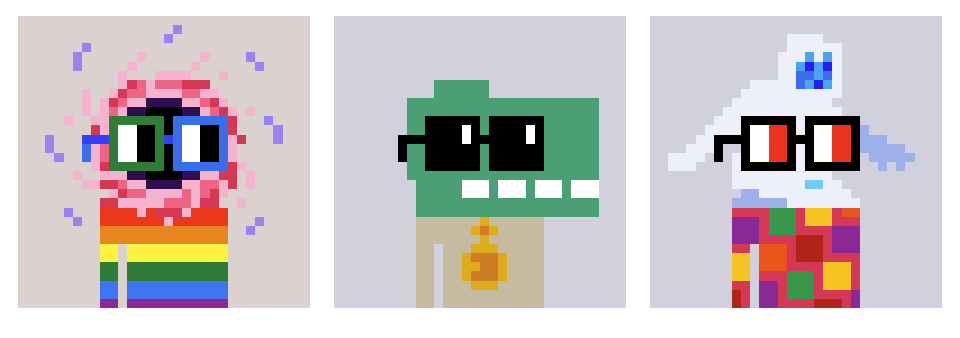CC0 = Content Composability
What are the considerations that come with a truly open content standard?
CC0, whereby creators relinquish their rights over copyright to the public domain, has been a hot topic lately. Bluechip NFT collections Nouns and Moonbirds, given their CC0 orientation, have catalyzed the conversation. Of course, their respective paths to CC0 were quite different. Nouns launched under the CC0 designation, while Moonbirds made an abrupt pivot that triggered both a divisive response from its community and precipitous drop in its floor price.
Communication, community input, and consistency are key in any project. All were absent in the Moonbirds pivot. Aaron McDonald, a serial tech entrepreneur and founder of the burgeoning Futureverse ecosystem, articulated the predicament perfectly on a recent episode of Adam Levy’s Mint (I highly recommend both the show and specific episode).
‘You can’t be Lamborghini and Toyota. You can’t be both of those things to consumers. If more and more people are building on your IP, but it was premised on the idea of being Lamborghini, and you transition to Toyota…that may be a bad path.’
This is less a commentary on CC0 projects being of lesser quality due to their open access. After all, Nouns have a floor price of 87 ETH that could be considered ‘Lamborghini’ level. It’s more about picking a lane and staying in it…or at least conferring with your community before collectively making the lane switch.
Admittedly, I was a skeptic on CC0 in the context of NFT communities at first. I initially thought the concept was antithetical to the ethos behind the ownership economy. How, and to who, does value accrue? To that end, what’s the point of purchasing an NFT if it doesn’t come with any specific commercial rights for the holder? Funny enough, my mind kept taking me back to a favorite movie of mine from childhood: The Incredibles. Near the end of the film, the villain, Syndrome, captures the Parr family and then delivers a final monologue detailing his plan. Despite not having innate super powers like the Parrs, Syndrome’s inventions allowed him to rise to supervillain status. When he got old and bored, as he exclaimed, he would release these inventions to the public, enabling everyone to be super. Then the kicker quote:
‘And when everyone’s super…no one will be.’
By opening up access to his inventions to anyone and everyone, Syndrome would dilute the value and prestige of the ‘super’ status. Therein lied my initial concern with CC0, which I believed negated both the status and commercial opportunities that can come with NFT ownership.
Content Composability
I’ve since changed my stance and that’s due in large part to Nouns, which is proving out a model for community-guided IP development and collective value accrual. If you’re not familiar with Nouns, I encourage you to read Austin Hurwitz’s piece ‘Power to the People’ (and subscribe to his weekly blog One Big Idea) which thoroughly details the project, its CC0 status, and various DAO-supported initiatives. The piece effectively summarizes the benefits of CC0 as:
Easier proliferation of content; by extension, less legal cost and headache by not having to chase down infringements
Brand longevity that isn’t contingent upon a centralized team and its execution of a roadmap

While purchasing a Noun might not give the owner any commercial license over that specific piece of content, it does represent a seat at the proverbial table. Nouns holders can draft and vote on proposals for how DAO treasury funds should be allocated. In other words, Nouns holders are instrumental in kickstarting and guiding the content and commerce flywheel. The lack of commercial rights over the purchased NFT is a divisive topic. In reality, taking advantage of a commercial license is no easy feat; it requires resources - capital, business acumen, and time. We will continue to see businesses like Jenkins the Valet spawn, but the majority of holders will be challenged to leverage licensed commercial use rights.
The question then is whether a truly open content standard will bear the most diversely creative fruit. In the context of open-source software, composability is the linchpin. It enables developers to freely use and integrate code from other applications into their products. Decentralized exchange SushiSwap is a product of composability; it spawned as a fork of Uniswap. If developers aren’t happy with a decentralized protocol, they can ‘clone’ it and subsequently modify it. Such was the case with SushiSwap.
CC0 enables content composability in its purest form. If I’m unhappy with the proposals through Nouns DAO, I’m free to try and monetize my own development or adaptation of the content. Unfettered access to IP creates unlimited possibilities for derivative works that can expeditiously drive brand awareness.
Tragedy of the Creative Commons
This unfettered access comes with concerns, however. As is frequently discussed in the context of CC0, there is little to no legal recourse that can be taken against actors that adapt IP in an offensive manner. Could this type of adaptation tarnish a brand entirely?
First conceptualized in 1833 by political economist William Forster Lloyd, The Tragedy of the Commons is a phenomenon that pertains to shared access of a public resource. The theory describes people’s collective predilection for acting in self-interest - irrespective of the negative impact it may have on others - and depleting a natural resource. Commonly cited examples include overfishing that can endanger species, or traffic congestion that causes harmful air pollution.
While the theory is typically applied to finite, (largely) tangible, and environmental resources - all in contrast with digital content - there is some overlap with CC0. Without effective parameters on content usage, you run the risk of malicious actors polluting the brand. CC0 explicitly acknowledges this in its FAQ section:
‘Just like anything already in the public domain today, anybody will be able to use your work for any purpose, even in ways you may find distasteful or objectionable.’
The CC0 license, however, does not apply to trademarks, which typically cover brand names and logos. The team behind Moonbirds, to its credit, is establishing a DAO that will promote commercialization while also looking to combat misuse of the trademark. They are limited in what they can do to protect the associated content, however.
Closing Thoughts
CC0, while not without risks and drawbacks, is the content standard that most closely aligns with its open-source software counterpart. Removing access barriers ultimately levels the creation playing field, and can enable a brand to frictionlessly evolve and persist based on a truly communal effort.
Sources (of Inspiration)
“CC0: The Good, The Bad, The Unknown” by Gesso Labs
“The Ownership Economy 2022” By Variant Team
“Power to the People” by Austin Hurwitz (One Big Idea)
“Aaron McDonald on the Vision for a Crypto-first Metaverse” by Adam Levy (Mint) with guest Aaron McDonald
“Bored Ape Yacht Club: The Case for Licensed Commercial Use Rights” by Economist
“How Nouns is Building Open-Source IP” by Andrew Hayward
“Tragedy of the Commons” by Harvard Business School
“CC0 FAQ” by CC0 Wiki




Thanks for the musing and keeping us ahead.
The line that gets me: "in reality, taking advantage of a commercial license is no easy feat." The mere right to exploit IP isn't inherently valuable. Exploitation rights become valuable when we invest behind them (e.g., building narrative, partnerships, etc.) or existing infrastructure exists to passively monetize. The superpowers / content unleashed analogy re: The Incredibles plays well here too as generative art projects increase access to various IP rights and licenses.